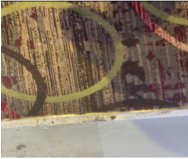Virginia Woman Sues Carnival Cruise Line After Tripping Over Unsafe Threshold Aboard Carnival Sunrise
Donna Jackson, a resident of Chester, Virginia, has filed a maritime personal injury lawsuit against Carnival Corporation in the Southern District of Florida. The case, filed under Case No. 1:25-cv-23753-KMW, alleges that Jackson sustained serious and permanent injuries after tripping over an unmarked and improperly designed floor threshold on Deck 8 of the Carnival Sunrise while en route to her muster station on September 30, 2024.
Cruise Passenger Suffers Head Trauma and Concussion After Fall Caused by Dangerous Doorway Transition on Carnival Sunrise
According to the complaint, Jackson had just boarded the Carnival Sunrise and was making her way to her muster station while pulling luggage behind her. As she walked along a hallway on Deck 8, she encountered a sudden and unmarked change in elevation between the carpeted floor and a section of exposed concrete. Despite wearing tennis shoes and paying attention to her path, Jackson failed to perceive the transition, which lacked proper contrast or warnings, causing her to trip and fall face-first.
Note: These photos were taken directly from the federal court filing.

The lawsuit states Jackson was thrown forward, landing with significant force on the right side of her face and losing consciousness for approximately thirty seconds. She suffered a traumatic brain injury, a concussion, and injuries to her shoulder and knee, including a sprained acromioclavicular ligament. These injuries, the complaint alleges, have caused ongoing pain, disability, and permanent impairment, drastically affecting Jackson’s quality of life.
Carnival Accused of Failing to Maintain Safe Walkways and Warn of Abrupt Elevation Changes on Sunrise
Jackson alleges that Carnival was negligent in failing to maintain a safe passenger walkway. The area where she fell, according to the complaint, contained an abrupt step-down from carpet to concrete with no visible signage, lighting, or markings to alert passengers. The lawsuit claims this condition was particularly dangerous due to its poor visual contrast and the lack of any ramp or barrier to ease or warn of the transition.
The complaint further alleges that Carnival’s crew members failed to inspect the area regularly and had no ramp or warning signs in place at the time of the incident. Notably, a ramp was reportedly installed shortly after Jackson’s fall, which her attorneys argue serves as evidence that Carnival was aware of the hazardous condition.
Lawsuit References Prior Trip and Fall Cases Aboard Carnival Ships as Evidence of Notice
To support its claims that Carnival was on notice of the unsafe design, Jackson’s legal team cites multiple prior lawsuits involving similar trip-and-fall incidents aboard Carnival vessels. These include:
- Foley v. Carnival Corp. (2024), involving a raised threshold on the Carnival Sunshine
- Goodenough v. Carnival Corp. (2023), where the plaintiff tripped over a protruding lip between carpet and tile
- Shideler v. Carnival Corp. (2023), regarding defective flooring on the Carnival Vista
- Eckels v. Carnival Corp. (2014), which involved a threshold near the casino on the Carnival Fascination
According to the complaint, these prior incidents demonstrate a pattern of unsafe flooring transitions across Carnival’s fleet and show that the cruise line was aware of the potential for injury but failed to take corrective action before Jackson’s incident.
Carnival Also Accused of Negligent Design, Crew Training Failures, and Violations of Safety Standards
Jackson’s lawsuit brings six counts of negligence, including negligent maintenance, negligent failure to warn, negligent design and material selection, and negligent training. The complaint alleges that Carnival not only failed to remedy a known hazard but also designed and approved the use of materials and thresholds that do not comply with accepted safety standards.
The suit references various international and U.S. safety regulations—including the International Maritime Organization’s SOLAS regulations, the Life Safety Code (NFPA 101), and ASTM F1166 guidelines—asserting that Carnival’s flooring failed to meet required safety standards for walkways and escape routes. It also claims that the cruise line ignored risks associated with reduced contrast sensitivity and peripheral vision loss among older passengers.
The complaint further contends that Carnival failed to adequately train its crew to inspect, maintain, or warn passengers about flooring hazards. Vicarious liability claims are brought against Carnival for the alleged negligence of its housekeeping and maintenance staff, who, according to the lawsuit, either failed to detect and remedy the dangerous condition or failed to follow internal policies for hazard reporting and passenger safety.
Plaintiff Seeks Damages for Brain Injury, Permanent Impairment, and Loss of Cruise Enjoyment
Jackson seeks damages for physical injuries, mental anguish, lost income, medical expenses, and loss of enjoyment of life. Her attorneys claim that had Carnival properly maintained the flooring, installed a ramp, or adequately warned of the elevation change, the fall—and her resulting traumatic brain injury—could have been avoided.
Tripped on a Cruise Ship Threshold or Doorway? You May Have a Claim Under Maritime Law
Flooring transitions, thresholds, and abrupt elevation changes are frequent causes of passenger injuries aboard cruise ships. Cruise lines are obligated under maritime law to ensure walkways are safe, especially in high-traffic areas leading to muster stations or cabins. If you were injured due to an unsafe walkway or unmarked threshold aboard a Carnival vessel or any other cruise line, you may be entitled to compensation for your injuries.
Contact us now to speak with a cruise ship trip and fall attorney.
Disclaimer: Our firm does not represent the plaintiff in this case and is not involved in the litigation. The information provided is a summary of allegations based on publicly available court filings. We make no representations about the truth of these allegations, are not commenting on the merits of the case, and are not predicting any outcome.











